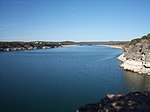Lake Georgetown
The only other reservoir on the San Gabriel River is Granger Lake, located near Granger, Texas about 25 airline miles downstream of Lake Georgetown.
Fish populations
Lake Georgetown has been stocked with several species of fish intended to improve the utility of the reservoir for recreational fishing. Fish present in Lake Georgetown include largemouth bass, catfish, white bass, hybrid striped bass, crappie, and sunfish.
Recreational uses
In addition to maintaining the dam that creates the reservoir, the U.S. Army Corps of Engineers maintains recreational facilities at the lake. Cedar Breaks Park, Russell Park, Jim Hogg Park and Overlook Park include day-use areas for picnics. Cedar Breaks, Jim Hogg and Russell Parks have boat ramp facilities for recreational boating. No camping is permitted at Overlook Park (the only free entry park on the lake).
The Goodwater Trail is a 26-mile-long (42 km) hiking trail that follows the entire perimeter of the lake with trailheads at Cedar Breaks, Overlook, Jim Hogg, and Russell Park. Tejas Camp, while technically on the San Gabriel River and not on the lake, also has trail access and is the only other entry or exit point to the southern half of the trail than Cedar Breaks. Mountain biking is allowed on the entire length of the loop thanks to the Austin Ridge Riders group for their work on the southern half of the trail. Beginner riders would be wise to stay on the North shore as it permits shorter trips with water refilling available and multiple exits. The southern shore presents a much more challenging ride with its rocky terrain and steep drop-offs and is not recommended for beginners. Also, there are no water refilling stations or trail exits on the approximately 12 miles between Cedar Breaks and Camp Tejas.
Overnight primitive camping is allowed at Sawyer Park, roughly halfway between Cedar Breaks and Tejas.
